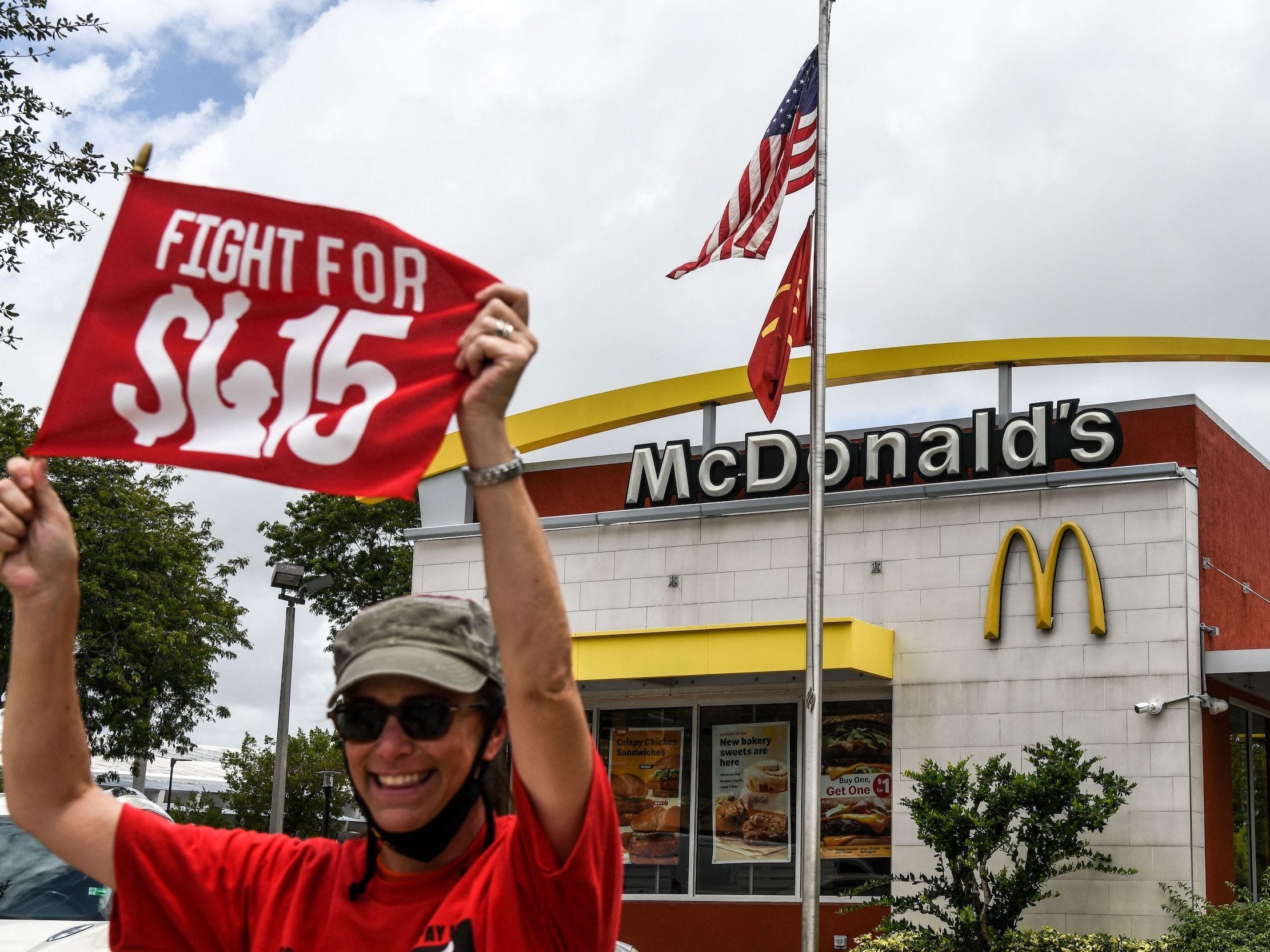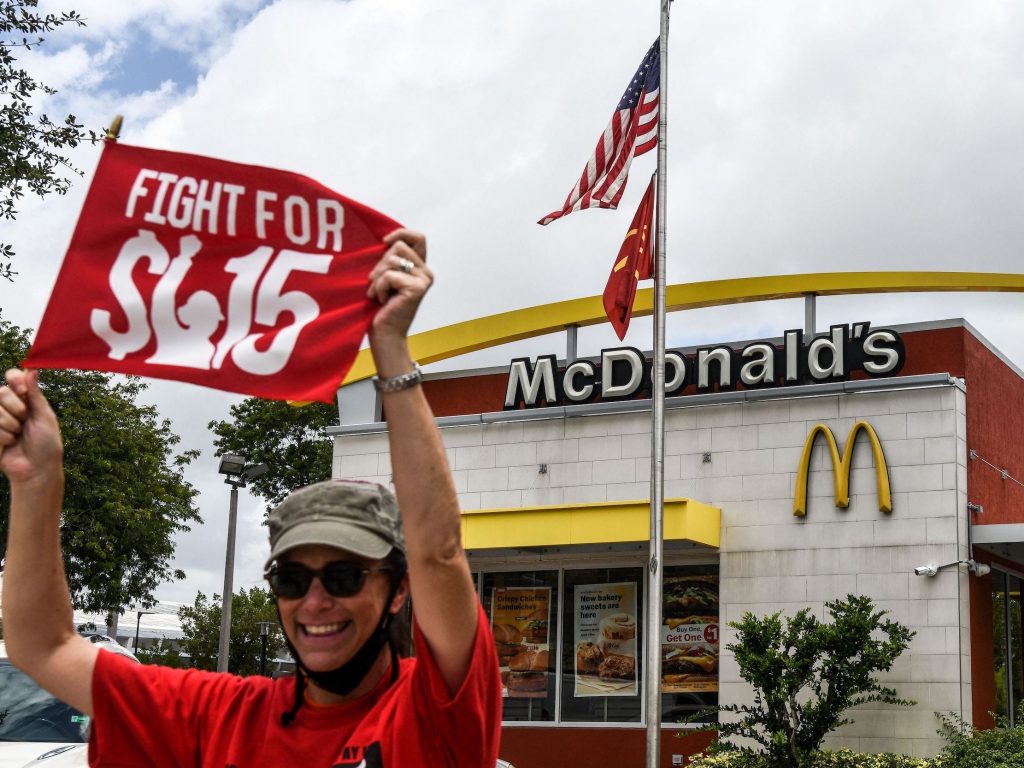
Chandan Khanna/AFP/Getty Images
- The economy is reopening but millions are still jobless as openings sit at record highs.
- In response to this 'labor shortage,' 25 GOP-led states are ending federal unemployment benefits early.
- Ex-Obama administration economist Heidi Shierholz says the minimum wage should go up instead.
- See more stories on Insider's business page.
Everywhere you look in the economy, there seems to be a shortage. The important things missing from shelves can be explained by factors like backed-up supply chains and a shipping crisis.
But another shortage that's emerged – with increasing prominence as America's recovery continues its long and winding path – is labor. Millions of workers are still out of work, even though businesses are reopening and want to hire.
One solution has to do with wages, and simply whether they're enough to get people to do certain jobs after a pandemic. May's jobs report showed wages on the rise for leisure and hospitality workers, but also showed workers quitting at the fastest rate documented in 20 years. While they saw significant pay jumps – by 7.2% from January to May – that only brought average hourly earnings up to $15.68.
"The wage growth that we've seen, say in leisure and hospitality, over the recent months, it's so little more than just getting those wages in that industry back to where they would have been if COVID hadn't happened," Heidi Shierholz, the director of policy at the left-leaning Economic Policy Institute, told Insider. She said talk that such workers are getting more leverage may be "overstated," and it probably won't be sustained or permanent.
GOP governors in 25 states have decided that it's too much leverage anyway, and that federal unemployment benefits in place for much of the pandemic have run their course. They've moved to end them months before their September expiration in President Joe Biden's stimulus. It's a decision that JPMorgan said is "tied to politics, not economics," noting that many of these states didn't have more job openings than jobless people.
Shierholz, a veteran of the Obama administration as chief economist at the Department of Labor, said broad reform is necessary in the labor market, and raising the minimum wage is a key aspect. That could both bring workers back and let higher wages stick, even after enhanced unemployment benefits taper off in September.
"That's smart, and it's good economics," Shierholz said. She also said that things like passing the PRO Act - legislation that could both strengthen unions and offer greater protections to nonunionized workers - would aid recovery.
Shierholz previously told Insider that prematurely ending unemployment benefits could stifle the recovery, especially since workers receiving those benefits are putting that money back into the economy. She said that if the concern is higher benefits keeping workers from work, ending benefits may not be the best route.
"You could quote unquote 'deal with that' by cutting off unemployment insurance benefits, which has all these terrible implications" - like stifling recovery and leave millions without income - "or you could do something like raise the minimum wage," she said.
Boosting wages to $15 may be helping with hiring and retention
Anecdotal evidence suggests that the businesses that did raise wages to $15 an hour succeeded in luring in new workers and boosting morale while cutting turnover. The Washington Post's Eli Rosenberg spoke with several business owners who had done just that. Progressives have long wanted to raise the federal minimum wage to exactly that $15-per-hour number.
At the 5th Street Group - which owns several restaurants in Charlotte and Charleston - raising starting wages to $15 an hour, and enacting new tipping measures for staffers who aren't normally tipped, helped the group go from being 50% to 60% staffed to nearly fully staffed in a matter of three weeks, according to the Post.
However, the likelihood of a $15 minimum wage being enacted anytime soon is low. Progressives led by Sen. Bernie Sanders pushed for its inclusion in President Joe Biden's American Rescue Plan, but the measure ultimately didn't survive under reconciliation rules. Eight Democrats voted against it, signaling even party-line support was not quite there. Talks on what, exactly, a minimum wage hike should be have also stalled recently.
The federal minimum wage is still $7.25. Although the above map shows that many states have opted to increase the minimum beyond that level, several remain at the federal rate.
Rhode Island recently passed a bill to raise the minimum wage to $15 by 2025, becoming the ninth state to pass a $15 minimum wage.
"Take a look at nationally - right now, states that are taking away the unemployment benefit of $300," Gov. Dan McKee said in a press conference after signing the minimum wage bill into law. "Those states are at $7.25 cents an hour. So Rhode Island is a leader on this."
But while raising the minimum wage might be key to an equitable recovery, according to Shierholz, it doesn't look like the proposition is going anywhere anytime soon - even if it could help solve the labor shortage that's holding back a full economic recovery.
